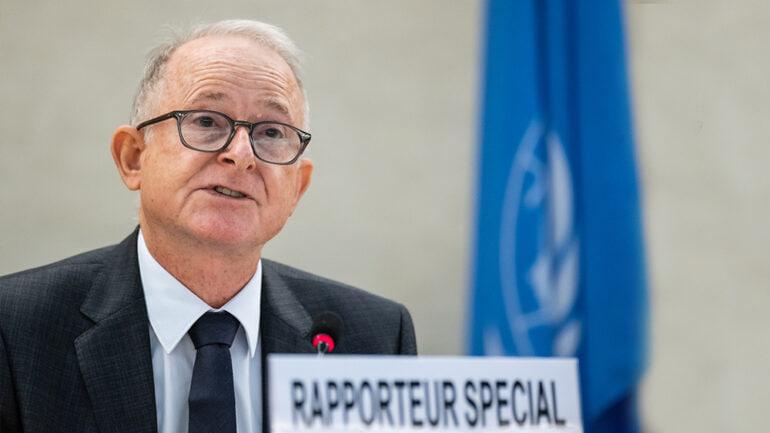RASC News Agency: Richard Bennett, the United Nations Human Rights Council’s Special Rapporteur for Afghanistan, delivered a powerful address in Geneva on Thursday, November 28, emphasizing the dire need for a comprehensive accountability framework to address the ongoing crisis in Afghanistan. He declared, “What is happening in Afghanistan should shake the conscience of the world.” Bennett highlighted the plight of the Afghanistani people, urging the international community to provide unwavering support and solidarity. His remarks came as policymakers, diplomats, and human rights advocates convened to deliberate on strategies for holding the Taliban accountable for their systematic human rights violations, particularly against women and girls.
The Geneva session was a critical platform to explore mechanisms for justice. Attendees included prominent human rights defenders, women’s rights activists, policymakers, and representatives of various nations. The participants underscored the urgent necessity of creating legal instruments to address the Taliban’s actions, which many described as “gender apartheid.” A focal point of the discussions was the need for robust documentation of the Taliban’s abuses and the development of legal pathways to prosecute these crimes. Advocates stressed that the systematic oppression of women under Taliban rule represents one of the most egregious examples of gender-based violence in modern history.
Marcos Gomez, Spain’s representative to Geneva, remarked, “If there exists a singular global example of extreme discrimination, oppression, and violence against women, it is Afghanistan under the Taliban’s rule. This is why we must prioritize documentation, accountability, and reparations for victims.” Bennett proposed a comprehensive roadmap for the global community to confront the Taliban’s actions, including: Establishing clear benchmarks for engaging with the Taliban.
Strengthening current investigative mechanisms, such as the International Criminal Court’s (ICC) ongoing investigations.
Criminalizing gender apartheid within international legal frameworks.
Ensuring the inclusion of Afghanistani women in all accountability and decision-making processes.
Collecting and preserving evidence to prosecute perpetrators of gender-based violence.
He further urged nations to increase humanitarian aid to Afghanistan while prioritizing support for women and minorities. Bennett described the Taliban’s violations as “severe, systematic, and widespread attacks on civilians,” which he asserted could constitute crimes against humanity, particularly gender persecution as outlined in the Rome Statute of the ICC. Participants also called for the establishment of legal mechanisms to formally categorize the Taliban’s policies as gender apartheid and emphasized the importance of justice for Afghanistani women and girls. Many expressed concerns that the Taliban continue to violate international law and disregard Afghanistan’s constitutional provisions that protect women’s rights.
While the Taliban have not issued a statement regarding the Geneva session, they have repeatedly claimed to uphold women’s rights based on their interpretation of Islamic values. Critics argue, however, that this interpretation serves as a pretext for imposing oppressive and regressive policies that systematically disenfranchise women and girls. The global community faces mounting pressure to act decisively to prevent further suffering in Afghanistan and to ensure that the voices of Afghanistani women are not silenced under the weight of the Taliban’s oppressive regime.






